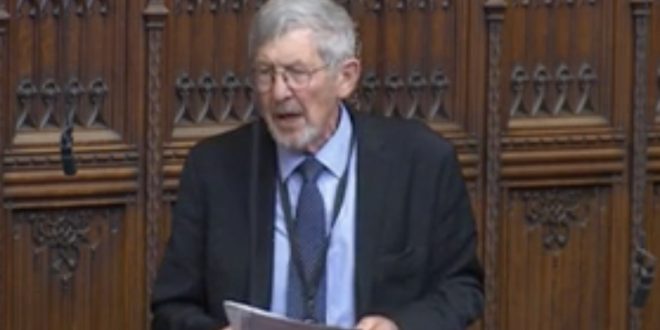Industry reformists at the House of Lords have stated that the Gambling Review’s White Paper falls significantly short on advertising policies and reforms to protect the public from harm.
This afternoon, the House of Lords hosted a short debate on the “Impact of gambling advertising, marketing and sponsorship on problem gambling”, put forward by Lord Foster of Bath (Liberal Democrats).
As the Chair of the Peers for Gambling Reform, Lord Foster is pleased that the majority of the group’s recommendations ‘in-whole or in-part’ were included in the Gambling Review’s White Paper. However, “except for the Gambling Commission taking a closer look at bonus offers such as free bets and spins, and the Premiership’s voluntary ban on front-of-shirt sponsorships, the White Paper proposes very little on gambling advertising reforms.”
The scarcity of advertising policies saw Foster state that the White Paper had failed to achieve one of its primary objectives: rectifying the conditions of the 2005 Gambling Act, which liberalised gambling advertising across UK media.
As such, the White Paper offers no grounds to regulate a sector spending “£1.5bn a year on gambling advertising”, and in which exposure and saturation have moved onto social media platforms such as “Facebook and Twitter (X)”, reporting over 1 million gambling adverts per year”.
 Foster declared, “As the Lords Committee noted, betting companies would not be spending such vast amounts on advertising if it didn’t work, leading to more gambling and greater risk of harm… We must ask why such little action has been proposed.”
Foster declared, “As the Lords Committee noted, betting companies would not be spending such vast amounts on advertising if it didn’t work, leading to more gambling and greater risk of harm… We must ask why such little action has been proposed.”
In his opening address, Foster pointed to MPs’ furore over this weekend’s article in The Observer which stated that “UK children were bombarded by gambling ads”, and a current advert displayed on the TFL’s network which states that “your carriage is now a casino“.
Continued incidents and misconduct see “the vast majority of the public want a clampdown on gambling advertising, including Conservative voters. A recent poll indicated that 77% of Conservative Councillors agree that tighter restrictions on advertising would reduce gambling-related harms.”
The absence of government action has seen stakeholders take matters into their own hands “as over 80 councils have moved to restrict advertising on land, buildings, and media that they own”. Meanwhile, in sports, “30 football clubs are going in alone, joining the Big Step campaign to end gambling advertising in our nation’s sport”.
White Paper has dismissed research on gambling advertising
The government was warned that public concern is about to rise on the matter, “because in July, the Gambling Commission will release new figures on gambling harm”.
“The Gambling Minister in the other place has already indicated that the figures are likely to show that 1.6 million people will classify as problem gamblers, and a further 6 million are at risk… if confirmed, these figures are far higher than those used to inform the government’s work on the White Paper.”
Public opinion aside, Foster noted that the White Paper had been dismissive of research on gambling advertising exposing the public to harm. A key dynamic that had been downplayed by the White Paper finds no ‘causal link’ between advertising and gambling harm.
“I’m prepared to accept that this is largely true. But it doesn’t mean that the research evidence doesn’t support the case for greater action. Academics are absolutely clear that in social science research, causal links are rarely even possible, but they are equally clear that findings justify much tougher action against gambling advertising.”
Opening his address to the floor, Foster concluded that the government must answer why it has chosen not to intervene “as gambling products and the way they are promoted have become harmful to individuals, family health, and damaging to the country”.
“Put simply, I ask the Minister to explain why the government is so out of step with the public and seemingly in step with the gambling industry”.
Government: CAP codes are best for regulating Gambling Advertising

Providing a response for DCMS, Lord Parkinson of Whitley Bay stated that the “Gambling Review had not been dismissive of research, in which it took an exhaustive look at the best available evidence on the impacts of gambling advertising”.
The government believes that reforms on gambling advertising form part of a “balanced package of wider industry reforms” that are designed to minimise harm.
Though gambling advertising has become more widespread since 2005, “especially within sports”, Lord Parkinson stated that its continual growth rate had not resulted in “an increase in gambling participation rates or population-level problem gambling rates, which have remained broadly stable”.
The government stands firm that the rules on gambling advertising are set by the Committee of Advertising Practice (CAP), which operators must follow.
“The body has developed a wide range of provisions to protect children and vulnerable adults. Compliance with these codes is a condition of Gambling Commission licences, which can and does take action regarding indiscipline of the codes.”
Lord Parkinson concluded that the White Paper recognises that gambling advertising has a proportionate impact on harm. Yet, the White Paper maintains the correct approach by tackling aggressive marketing advertising, reducing exposure, and improving all-round compliance standards.









